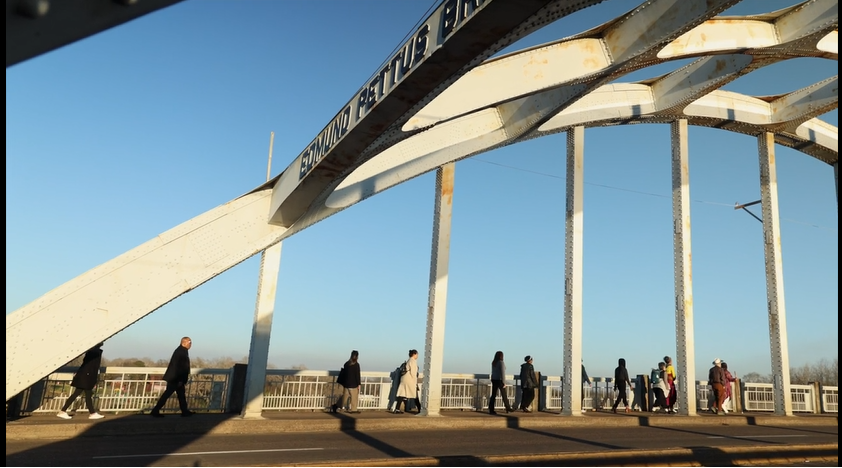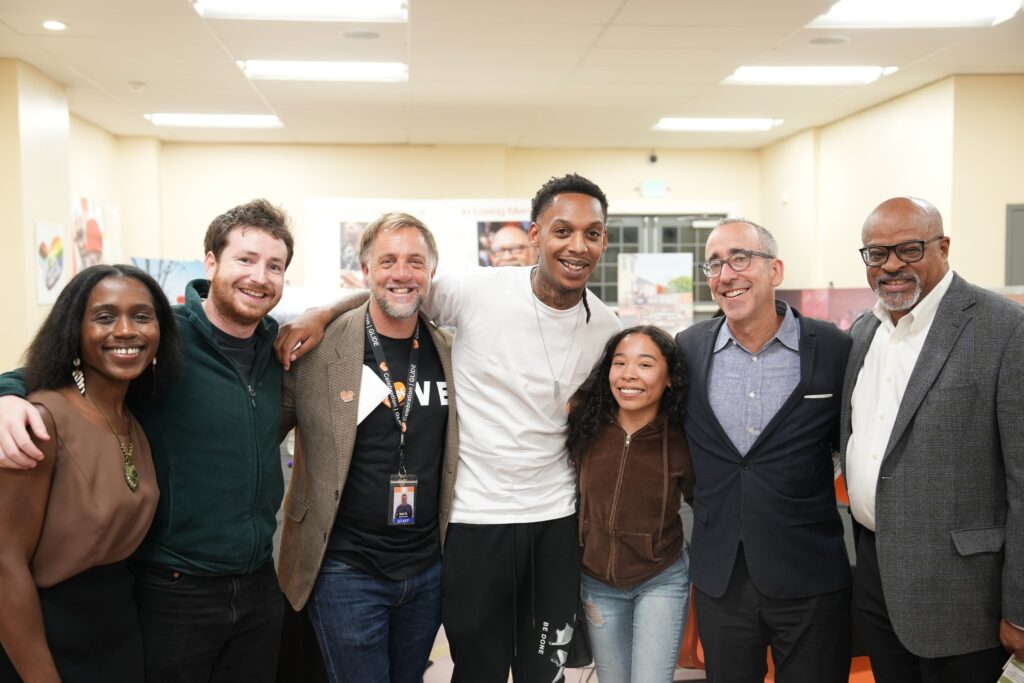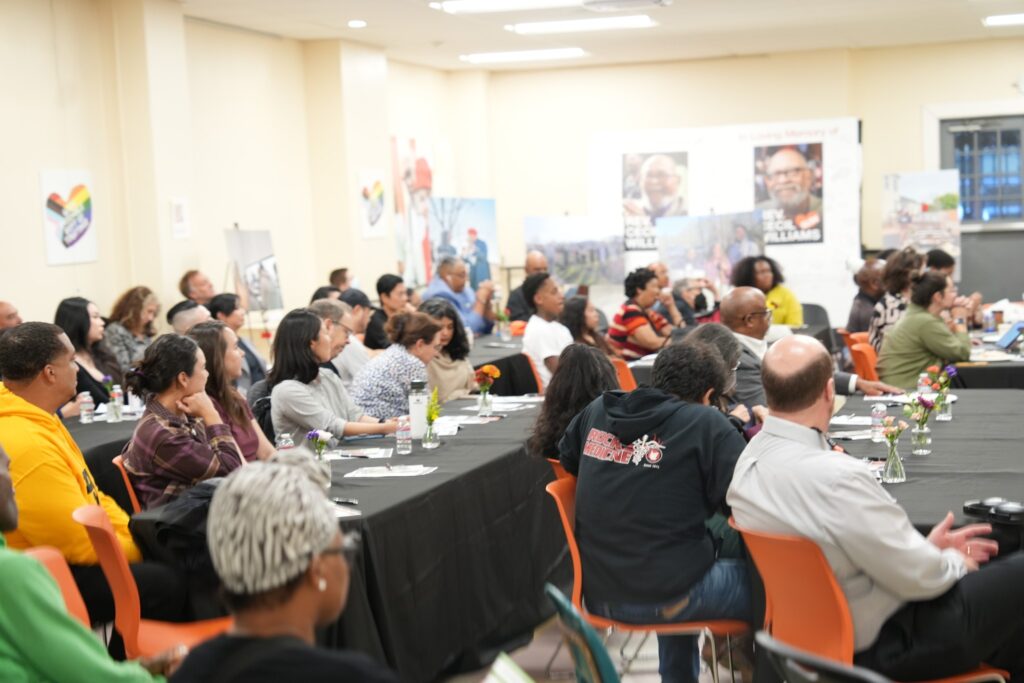
On Saturday September 11th, GLIDE packed Freedom Hall for a twelve-minute documentary film and panel discussion about GLIDE’s Alabama Pilgrimage.
The film, Pursuing Progress, was created by the talented born-and-raised Tenderloin filmmaker Lana Vy, and you can watch it for free online here. The Alabama Pilgrimage is a tour for GLIDE community members through the civil rights and slavery museums and monuments in Alabama. The trip leads white people along the spiritual journey of becoming more compassionate allies, and it helps Black people contextualize their modern-day challenges with a deeper understanding of their ancestors’ heroism and resilience.
Our President & CEO, Dr. Gina Fromer, opened the event by talking about her feelings about her upcoming first Alabama Pilgrimage trip. “I know that when I go on this trip, as a Black woman, I’m going to feel things I never felt,” said Dr. Gina, contemplating the intense emotion that comes from being immersed in the history of slavery and oppression. “But this trip is important because of truth-telling. We’ve got to tell the truth about what happened,” she added.
How historical truth-telling leads to Black empowerment

GLIDE staff, including (L) Naeemah Charles, Senior Director of the Center for Social Justice (far left), Alabama trip participant Deshawn Dupre Brown (center) and GLIDE Rabbi Michael Lezak (2nd from the right)
Terrie Kendrix, GLIDE’s Women’s Center Program Coordinator, helped introduce the film by explaining the effect of the pilgrimage on her own career. “The Alabama trip broke my heart and gave me the strength I needed to prosper at GLIDE,” she said. She was working as a Case Manager at GLIDE when she went on the pilgrimage, and the trip inspired her to apply for promotion to her current position.
Terrie was not the only one who gained a better understanding of her own strength and potential by learning what her Black ancestors overcame. DeShawn, a client of GLIDE selected to go on the pilgrimage, had a similar experience to share. “Seeing my ancestor’s journey made me want to do better. They risked their lives for us, hoping we could have better outcomes. We come from some strong people. I’m grateful we came together as a community to learn about it together.” He also shared his outrage on how mass incarceration has become a modern-day form of slavery.
You can read more about GLIDE’s campaign to end modern-day slavery here.
The role of reclaiming our voices in ending racial oppression

Attendees at the Pursuing Progress film screening inside GLIDE’s Freedom Hall
Regina Wells, GLIDE’s Senior Manager of Training and Development, spoke on the panel about the importance of music and self-expression to anti-racist resistance. “The vibration that comes from singing is how my people survived day in and day out without sleep, not properly nourished or fed,” she said, referring to the cruel conditions on plantations and slave ships. “Sounds are our first nourishment… I want to apologize today on behalf of anyone who ever discouraged you from speaking or singing. Anyone who ever said, ‘you shouldn’t sing,’ or ‘keep it down in here!’ I want you to promise yourself today, ‘I will reclaim my voice, my authentic voice.’”
Unlike South Africa, the United States has never undergone a truth and reconciliation process for the racially motivated cruelty and violence in U.S. history. So part of the Alabama Pilgrimage’s purpose is for us here in San Francisco to begin our own process of truth and reconciliation. It is foundational to this effort that each of us step into our own truth, our own voice.
Opportunities for white people to grow in accountability, empathy, and allyship
GLIDE’s Rabbi Michael Lezak, our Social Justice Director, spoke humorously and self-deprecatingly about the missteps on his own white allyship journey. In a culture where people can be tense about admitting their own mistakes, Rabbi’s willingness to lovingly make fun of himself opened up safe space.
Rabbi Michael Lezak served as rabbi in a wealthy and very white area of Marin County for 14 years. His transformation began when he traveled past the San Quentin prison while reading The New Jim Crow, a book about racial discrimination in the justice system. In that moment, he was struck by the necessity of leading his synagogue on their own anti-racist journey. He brought in speakers like Bryan Stevenson, the author of Just Mercy, who fights to overturn death penalties for prisoners. That helped inform the vision for his work at GLIDE, including the Alabama Pilgrimage.
Rabbi’s original vision for the Alabama Pilgrimage was for hearts to be shattered open by the devastating nature of our country’s history. However, his Black colleague told him, “Black people’s hearts are shattered every day in America.” She urged him to redesign the pilgrimage to focus less on Black pain and suffering and more on Black empowerment and hope, adding stops to meet thriving Black activists and students. “She made me realize that the pilgrimage should be like a hug for Black and Brown people who encounter harm every day,” Rabbi said.
Rabbi joked, “My colleague was too polite to call me, ‘dumb white Rabbi,’ but that was what she meant. Through her, I learned the importance of designing the trip to be a celebration of Black wisdom, resilience, brilliance, and creativity.”
The panel closed with a challenge from our rabbi to the audience: “How might we dream prophetic dreams of healing and transforming our ancient wounds?” He added, “We will not begin to heal America, until we help both George Floyd’s family heal and Derek Chauvin and his family to heal.” GLIDE’s radical inclusivity and unconditional love encompasses the healing of both the oppressed and the oppressor.
Rabbi’s sentiment reminded me of the words of the famous poet James Baldwin. In a letter to his nephew, Baldwin speaks movingly about how white people remaining “innocent” to the harms of racism cripples their spiritual development.
Therefore, Black liberation and white liberation are bound up together. “There is no reason for you to try to become like white men and there is no basis whatsoever for their impertinent assumption that they must accept you, “ Baldwin writes to his nephew. “The really terrible thing, old buddy, is that you must accept them, and I mean that very seriously. You must accept them and accept them with love, for these innocent people have no other hope.
They are in effect still trapped in a history which they do not understand and until they understand it, they cannot be released from it…. those innocents who believed that your imprisonment made them safe are losing their grasp of reality. But these men are your brothers, your lost younger brothers, and if the word ‘integration’ means anything, this is what it means, that we with love shall force our brothers to see themselves as they are, to cease fleeing from reality and begin to change it, for this is your home, my friend. Do not be driven from it.”
